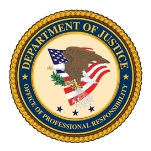OPR was created in 1975, to maintain standards of ethical and legal conduct inside the Justice Department. Its creation was a response to the criticisms of political influence in the Justice Department during the Watergate Scandal. OPR had one Chief Council, Mike Shaheen, from its inception until 1997, when the current Chief Council was appointed.
The OPR is authorized to investigate allegations of professional misconduct by any of the Department of Justice’s 10,000 attorneys relating to the attorneys’ actions in investigation, litigation, or giving legal advice. The OPR receives several hundred complaints about US Attorneys per year, from judges, defense attorneys, other Department attorneys and others. About 2/3 of these complaints are determined not to warrant further investigation because the complaints are vague and unsupported by evidence or because they are outside OPR’s jurisdiction. About 2/3 of the remaining 250 or so complaints are handled as inquiries, to be resolved by review of written records, including case transcripts and the accused attorney’s written response to the complaint. The remaining third, including some 15% of inquiries that do not resolve the complaint, become full investigations. In these cases, OPR attorneys will interview judges, attorneys, witnesses and other relevant parties, as well as review case records. If the OPR finds that misconduct has occurred, recommendations for discipline of individual attorneys follow, recommendations which Department management has discretion whether to implement. The OPR has also referred cases of intentional misconduct to state bar associations.
Ideology-Based Hiring at Justice Broke Laws, Investigation Finds
(by Carrie Johnson, Washington Post)
Mike Shaheen was Chief Council from the creation of OPR to 1997 (22 years). He was succeeded by his Deputy as Acting Counsel for five months, and then by H. Marshall Jarrett.
- Table of Contents
- Overview
- History
- What it Does
- Where Does the Money Go
- Controversies
- Suggested Reforms
- Comments
- Leave a comment

Robin C. Ashton, a career prosecutor at the U.S. Department of Justice and a top official in the District of Columbia’s U.S. Attorney’s Office, was named by then-attorney general Eric Holder as chief counsel and director of the Office of Professional Responsibility (OPR) on December 23, 2010. OPR, whose creation in 1975 was an outgrowth of the Watergate scandal and whose mission is to maintain and enforce legal and ethical conduct by U.S. Attorneys, had been plagued by controversy during the George W. Bush administration.
Ashton earned her B.A. in English from the University of Michigan, and her J.D. from the College of William and Mary, Marshall-Wythe School of Law.
Ashton was hired in January of 1991 as an assistant U.S. attorney for the U.S. Attorney's Office for the District of Columbia (USAO-DC), the largest such office in the country. She began her career in the department’s Antitrust Division and, over the course of a decade, her work ranged from the prosecution of more than 50 felony jury trials to supervising hundreds of grand jury investigations. For five of her years at USAO-DC, Ashton served as the executive assistant U.S. attorney for management, handling oversight of special operations and cases.
In 2001, Ashton became the Justice Department’s deputy director of the Executive Office for U.S. Attorneys, overseeing litigation divisions and operational elements of the nation’s 94 U.S. Attorneys’ Offices. During her five-year tenure in that post, Ashton became the victim of a scandal over politicized hiring at the Justice Department. A promised promotion was snatched away from her due to the actions of Monica Goodling, a 31-year-old, inexperienced lawyer who had just been recruited by the DOJ. “You have a Monica problem,” Ashton was told by her supervisor, several DOJ officials told The New York Times. “She believes you’re a Democrat and doesn’t feel you can be trusted.”
Goodling, who had once ordered that partially nude statues in the Justice Department's Great Hall be covered up with drapes, used a political litmus test, along with other senior officials, to block the hiring of suspected Democrats. She also graded U.S. attorneys’ loyalties to the George W. Bush administration, firing those who didn’t measure up. One job applicant was even asked, “Have you ever cheated on your wife?” Goodling was promoted to the position of White House liaison, but an investigation eventually concluded she had violated federal law.
At a 2007 House hearing into the scandal, James Comey—then deputy attorney general, who had once praised Goodling’s abilities as a lawyer—testified, “I don’t know how you would put that genie back in the bottle, if people started to believe we were hiring our A.U.S.A.s [Assistant United States Attorneys] for political reasons. I don’t know that there’s any window you can go to to get the department’s reputation back if that kind of stuff is going on.”
Two weeks after Goodling sabotaged her promotion in 2005, Ashton left her job. She went on that year to assume a year-long detail at the Senate Judiciary Committee. It was under the Obama administration that she was tapped for the leadership post at OPR, a division of the DOJ that came with its own baggage. Indeed, Ashton took the reins of an agency that has weathered a fair amount of controversy over the years, including accusations that the lethargic pace of investigating legal opinions issued by the George W. Bush administration laid the groundwork for the torture inflicted by American interrogators on post-9/11 detainees. OPR was also accused of mishandling evidence that resulted in the collapse of a 2008 corruption case against the late Sen. Ted Stevens (R-Alaska).
In June 2016, Ashton incurred the displeasure of Sen. Charles Grassley (R-Iowa), chairman of the Senate Judiciary Committee, when she refused to appear at a hearing about allegations of sexual harassment and other misconduct at the Drug Enforcement Agency.
-Danny Biederman
To Learn More:

In becoming only the third person to head the Department of Justice’s Office of Professional Responsibility (OPR) since its post-Watergate creation in 1975, Mary Patrice Brown is expected to help Attorney General Eric Holder rebuild the reputation of the Justice Department in the wake of scandals involving the trial of U.S. Senator Ted Stevens (R-AK) and the firing of U.S. Attorneys by the Bush administration. Brown has distinguished herself as a strong advocate of prosecutors sharing evidence with the defense.
- Latest News
- D.C. Public Schools will Teach all Second-Graders to Ride a Bike
- New Rule in Germany Limits Sales of Sex-Themed E-Books to 10pm to 6am
- What Happened to the 6-Year-Old Tibetan Boy the Chinese Government Kidnapped 20 Years Ago?
- U.S. Ambassador to Turkey Photoshops his Hair Color to Mock Turkish Mayor
- Mystery Artist Calls Attention to Unfixed Potholes by Drawing Penises around Them
OPR was created in 1975, to maintain standards of ethical and legal conduct inside the Justice Department. Its creation was a response to the criticisms of political influence in the Justice Department during the Watergate Scandal. OPR had one Chief Council, Mike Shaheen, from its inception until 1997, when the current Chief Council was appointed.
The OPR is authorized to investigate allegations of professional misconduct by any of the Department of Justice’s 10,000 attorneys relating to the attorneys’ actions in investigation, litigation, or giving legal advice. The OPR receives several hundred complaints about US Attorneys per year, from judges, defense attorneys, other Department attorneys and others. About 2/3 of these complaints are determined not to warrant further investigation because the complaints are vague and unsupported by evidence or because they are outside OPR’s jurisdiction. About 2/3 of the remaining 250 or so complaints are handled as inquiries, to be resolved by review of written records, including case transcripts and the accused attorney’s written response to the complaint. The remaining third, including some 15% of inquiries that do not resolve the complaint, become full investigations. In these cases, OPR attorneys will interview judges, attorneys, witnesses and other relevant parties, as well as review case records. If the OPR finds that misconduct has occurred, recommendations for discipline of individual attorneys follow, recommendations which Department management has discretion whether to implement. The OPR has also referred cases of intentional misconduct to state bar associations.
Ideology-Based Hiring at Justice Broke Laws, Investigation Finds
(by Carrie Johnson, Washington Post)
Mike Shaheen was Chief Council from the creation of OPR to 1997 (22 years). He was succeeded by his Deputy as Acting Counsel for five months, and then by H. Marshall Jarrett.
Comments

Robin C. Ashton, a career prosecutor at the U.S. Department of Justice and a top official in the District of Columbia’s U.S. Attorney’s Office, was named by then-attorney general Eric Holder as chief counsel and director of the Office of Professional Responsibility (OPR) on December 23, 2010. OPR, whose creation in 1975 was an outgrowth of the Watergate scandal and whose mission is to maintain and enforce legal and ethical conduct by U.S. Attorneys, had been plagued by controversy during the George W. Bush administration.
Ashton earned her B.A. in English from the University of Michigan, and her J.D. from the College of William and Mary, Marshall-Wythe School of Law.
Ashton was hired in January of 1991 as an assistant U.S. attorney for the U.S. Attorney's Office for the District of Columbia (USAO-DC), the largest such office in the country. She began her career in the department’s Antitrust Division and, over the course of a decade, her work ranged from the prosecution of more than 50 felony jury trials to supervising hundreds of grand jury investigations. For five of her years at USAO-DC, Ashton served as the executive assistant U.S. attorney for management, handling oversight of special operations and cases.
In 2001, Ashton became the Justice Department’s deputy director of the Executive Office for U.S. Attorneys, overseeing litigation divisions and operational elements of the nation’s 94 U.S. Attorneys’ Offices. During her five-year tenure in that post, Ashton became the victim of a scandal over politicized hiring at the Justice Department. A promised promotion was snatched away from her due to the actions of Monica Goodling, a 31-year-old, inexperienced lawyer who had just been recruited by the DOJ. “You have a Monica problem,” Ashton was told by her supervisor, several DOJ officials told The New York Times. “She believes you’re a Democrat and doesn’t feel you can be trusted.”
Goodling, who had once ordered that partially nude statues in the Justice Department's Great Hall be covered up with drapes, used a political litmus test, along with other senior officials, to block the hiring of suspected Democrats. She also graded U.S. attorneys’ loyalties to the George W. Bush administration, firing those who didn’t measure up. One job applicant was even asked, “Have you ever cheated on your wife?” Goodling was promoted to the position of White House liaison, but an investigation eventually concluded she had violated federal law.
At a 2007 House hearing into the scandal, James Comey—then deputy attorney general, who had once praised Goodling’s abilities as a lawyer—testified, “I don’t know how you would put that genie back in the bottle, if people started to believe we were hiring our A.U.S.A.s [Assistant United States Attorneys] for political reasons. I don’t know that there’s any window you can go to to get the department’s reputation back if that kind of stuff is going on.”
Two weeks after Goodling sabotaged her promotion in 2005, Ashton left her job. She went on that year to assume a year-long detail at the Senate Judiciary Committee. It was under the Obama administration that she was tapped for the leadership post at OPR, a division of the DOJ that came with its own baggage. Indeed, Ashton took the reins of an agency that has weathered a fair amount of controversy over the years, including accusations that the lethargic pace of investigating legal opinions issued by the George W. Bush administration laid the groundwork for the torture inflicted by American interrogators on post-9/11 detainees. OPR was also accused of mishandling evidence that resulted in the collapse of a 2008 corruption case against the late Sen. Ted Stevens (R-Alaska).
In June 2016, Ashton incurred the displeasure of Sen. Charles Grassley (R-Iowa), chairman of the Senate Judiciary Committee, when she refused to appear at a hearing about allegations of sexual harassment and other misconduct at the Drug Enforcement Agency.
-Danny Biederman
To Learn More:

In becoming only the third person to head the Department of Justice’s Office of Professional Responsibility (OPR) since its post-Watergate creation in 1975, Mary Patrice Brown is expected to help Attorney General Eric Holder rebuild the reputation of the Justice Department in the wake of scandals involving the trial of U.S. Senator Ted Stevens (R-AK) and the firing of U.S. Attorneys by the Bush administration. Brown has distinguished herself as a strong advocate of prosecutors sharing evidence with the defense.
- Latest News
- D.C. Public Schools will Teach all Second-Graders to Ride a Bike
- New Rule in Germany Limits Sales of Sex-Themed E-Books to 10pm to 6am
- What Happened to the 6-Year-Old Tibetan Boy the Chinese Government Kidnapped 20 Years Ago?
- U.S. Ambassador to Turkey Photoshops his Hair Color to Mock Turkish Mayor
- Mystery Artist Calls Attention to Unfixed Potholes by Drawing Penises around Them






Comments